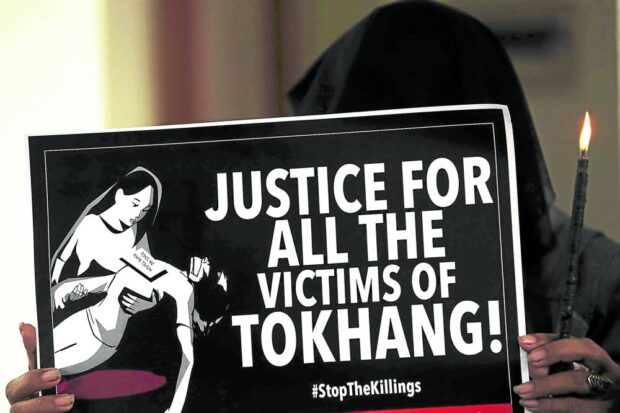
DRUG WAR Relatives of victims of extrajudicial killings under former President Rodrigo Duterte’s drug war gather at St. Joseph Parish in Bagong Silang, Caloocan City, on Jan. 27, 2018, to denounce the revival of the government antidrug drive “Oplan Tokhang.” —NIÑO JESUS ORBETA
MANILA, Philippines — It may be only a “matter of time” for the International Criminal Court (ICC) probers to come to the Philippines given the renewed push to convince the Marcos administration to cooperate with the court’s investigation into alleged crimes against humanity committed in the conduct of the drug war during the term of former President Rodrigo Duterte, lawyers for the drug war victims said on Monday.
Former lawmaker Neri Colmenares and Kristina Conti, who both serve as legal counsels for the families of victims of extrajudicial killings (EJK) under the drug war, also affirmed their commitment to “support the investigation to the most extent possible.”
While they did not say whether ICC probers have already contacted them, Colmenares said they “expect to be informed” should they come to Manila.
Colmenares pointed out that during the House hearings on the resolutions asking the government to cooperate with the ICC, the Office of the Solicitor General (OSG) said it would not cooperate but would also not interfere with the ICC prosecutor.
“So I think it’s a matter of time that they’ll get here,” he noted. “This would further strengthen their case as the families of EJK victims and their witnesses will now have access to ICC prosecutors.”
As to whether the ICC has already requested the government to cooperate was still unknown, according to Conti.
On Friday, Solicitor General Menardo Guevarra said there was no reason to bar representatives of the ICC from entering the country so long as they would not do anything illegal here.
In an interview with CNN Philippines, Guevarra, who was justice secretary from 2018 to 2022, added that it was up to the Department of Justice (DOJ) and the Bureau of Immigration (BI) whether they would let ICC representatives enter the country.
But he pointed out that the country’s immigration laws have “a wide latitude of discretion on the part of our immigration authorities to admit or not to admit certain persons whom they think may be considered undesirable.”
“From my point of view, for as long as there will be no [illegal] activities to be conducted here, that they have the proper travel documents, I do not see any reason why they should be prevented from coming in because they’re going to interview certain persons, gather certain documents, so forth and so on,” Guevarra said.
He also told the Inquirer on Friday that collecting documents such as affidavits could not be considered an illegal activity.
Rejoining Rome Statute
It has been five months since the ICC’s Appeals Chamber rejected the Philippine government’s appeal to stop Prosecutor Karim Khan’s investigation into the alleged crimes against humanity committed during Duterte’s war on drugs from 2016 to 2019, and the period when he was Davao City mayor from 2011 to 2016.
Even if the Philippines is no longer a member of the Rome Statute, the ICC will likely send a request to cooperate (including an official request to enter the country and talk to government officials) through diplomatic channels.
Under the Rome Statute, however, governments must keep such requests confidential, “except to the extent necessary to execute the request,” Conti said.
“If the ICC asks the state to cooperate, the state must keep the request confidential. It is the ICC which can choose to break confidentiality by announcing or publishing the request,” she pointed out.
“Unfortunately, in more ways than one, discreetness benefits an ongoing investigation, especially with regard to security,” she added.
Colmenares had earlier floated the idea that the ICC must already ask the Philippines to cooperate after President Ferdinand Marcos Jr. himself admitted that his administration was studying the option of returning to the fold of the Rome Statute.
Probe drug links
In the Lower House, Kabataan party-list Rep. Raoul Manuel on Monday called for a probe of Duterte’s alleged link to the illegal drug trade following the claims made by retired Davao policeman Arturo Lascañas, saying this was a “necessary” step in providing context to the possible investigation by the ICC.
Manuel noted that should Lascañas’ claims on the former president’s links to the illicit drug trade be proven, it would show that Duterte’s war on drugs was fake.
He said in Filipino: “If [Lascañas’ allegations are] true, it would seem that the war on drugs was intended to go after (narcotics industry) rivals and ensure monopoly of the illegal drug trade by virtue of the powers of Malacañang.”
“This should be clarified in the ICC investigation, which is why it should proceed,” Manuel said, noting though that Congress “should also conduct our probe in this matter.”
The lawmaker called on other possible witnesses to come forward and make public what they know of the drug war, similar to Lascañas who submitted an affidavit to the ICC.
Manuel appealed to people who served as right-hand men or enforcers in the war on drugs to identify the “masterminds” and perpetrators of extrajudicial killings to “give justice to thousands of youth killed [during Duterte’s drug war] and shed light on why they were killed.”
Late last month, the House committees on justice and on human rights agreed to adopt three resolutions urging the government to cooperate with the ICC investigation.
These were House Resolution (HR) No. 1477 filed by Manila Rep. Bienvenido Abante Jr. and 1-Rider Rep. Ramon Rodrigo Gutierrez, the Makabayan bloc’s HR 1393, and Albay Rep. Edcel Lagman’s HR 1482.
“Cooperating with the ICC underscores our commitment to upholding human rights,” Abante said.